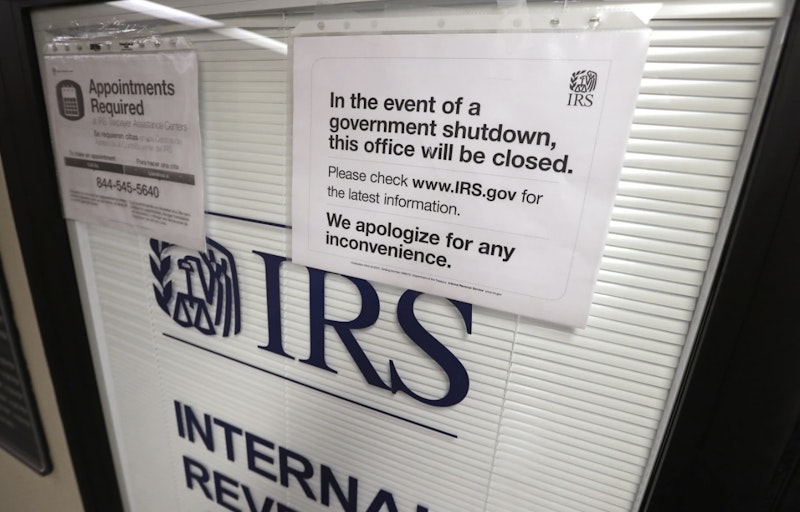While Republican factions bickered over who should take the “blame” if their party’s faltering budget negotiations with the Democrats lead, mercifully, to a brief partial shutdown of the federal government, a happier debate occurred at Manhattan’s Soho Forum last week—about whether to abolish government altogether, at all levels, forever.
Yaron Brook, president of the largely anti-government Ayn Rand Institute, argued against that idea, oddly enough, placing him for one evening on the side where dwell the socialists, Democrats, mainstream conservatives, and most of the human race, that ignorant bunch of savages.
Brook argued the affirmative, in other words, on the topic “Resolved: Anarcho-Capitalism Would Definitely Be a Complete Disaster for Humanity”—while my fellow anarcho-capitalist, economist Bryan Caplan, argued that the world would be happiest, safest, and most prosperous in a system of people owning tracts of land and doing as they please with their own bodies and property so long as they don’t use others’ property without permission.
That system would eliminate arguments like the one going on in Washington right now about whether and how to avoid a government shutdown, since there’d be no government to shut down. Sounds ideal. Don’t violate property rights, expect reprisals if you do, and otherwise live your life while others live theirs.
The debaters admitted that, to much of the world, their disagreement would look hair-splitting. I often used to elide the difference between anarchists and so-called “minarchists” in philosophical conversations myself, figuring that in the current, government-dominated world, we’re so far removed from worrying about whether to reduce government to one percent of its current size or zero percent, it was hardly worth mentioning the distinction.
(The distinction is especially small in the case of Brook and Caplan, since Brook wants government to be minuscule while Caplan hopes parcels of property would often be somewhat large and almost micro-state-like. Also, both favor open borders—that’s the title of one of Caplan’s books, in fact—whereas a surprisingly large number of people who call themselves anarcho-capitalists are downright enthusiastic about border enforcement, wrongly see it as morally equivalent to keeping trespassers off private property, which strikes me as a bit like saying public property is a little like private property, so, hey, who cares whether we’re socialists or not?)
Brook and Caplan are right, though, to think that, all joking aside, the difference between the state existing (at whatever size) and not existing at all is a fundamental distinction. They apparently quibbled good-naturedly before the debate about the resolution wording but considered something more along the lines of the question “Are Anarcho-Capitalists Crazy?” To the Objectivists, anyone who disagrees with them on even the smallest point tends to get dismissed, in Randian fashion, as “irrational,” so some wording like that might’ve been apt.
What I find strange about Objectivists like Brook—well, one thing I find strange—is that for all their admirable opposition to big government and encouragement of logic, they somehow think government—that engine of madness, waste, and murderous destruction—can become a guarantor of liberty, or a guarantor of anything in this world that’s usually made more, not less, chaotic by government itself. If the Objectivists agree government can barely deliver mail competently, why do they think it’ll be the best method of securing basic rights, defending against invaders, or anything else? As with all other things in life, get government out of the way so markets and free individuals can perform these functions.
But most people, especially ones with preacher-like zeal of the kind Brook displays before his loyal Objectivist flock, want some kind of game-ending, system-freezing, promise-keeping, can’t-fail backstop to all politics and morality—be it an imagined God, an unchanging government, or an infallibly virtuous strongman—something that will ensure an end to uncertainty and tumult, even if it means creating a central power that’ll be harder to escape when, inevitably, things go wrong.
Some Objectivists are themselves anarcho-capitalists (something that’s strictly speaking logically or at least terminologically impossible, Brook says when I ask him toward the end of that video linked above whether he acknowledges the overlap in these factions), reasoning like other anarcho-capitalists that if it’s wrong to violate property rights, it’s wrong to violate them even for the purpose of creating a police department or court system (and these services could be provided by the market and already routinely are, albeit in piecemeal fashion).
This night, however, the statists (as libertarians in general often derisively call boosters of government) narrowly carried the day in the audience vote. The weird, almost instinctual equating of government with objectivity and stability continues, even in a libertarian-leaning crowd. I’m grateful such topics are even being debated—but hope I live to see a time when humanity is done with statism in all its forms, from Objectivism to Stalinism.
—Todd Seavey is the author of Libertarianism for Beginners and is on X at @ToddSeavey

